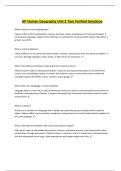AP Human Geography Unit 3 Test Verified Solutions
What is culture in human geography?
Culture refers to the shared beliefs, customs, practices, values, and behaviors of a group of people. It
encompasses language, religion, food, clothing, art, architecture, and many other aspects that define a
group’s way of life.
What is cultural diffusion?
Cultural diffusion is the spread of cultural beliefs, customs, and practices from one group to another. It
can occur through migration, trade, media, or other forms of interaction. ✔️
What is the difference between material and non-material culture?
Material culture refers to the physical objects, resources, and spaces that people use to define their
culture, such as buildings, clothes, and tools. Non-material culture, on the other hand, includes the
intangible aspects like beliefs, values, customs, and language. ✔️
What is the role of language in cultural identity?
Language plays a critical role in cultural identity by serving as a tool for communication, preservation of
traditions, and expression of beliefs. It shapes how people see themselves and interact with the world
around them. ✔️
What is a dialect?
A dialect is a variation of a language that is spoken by a particular group of people within a specific
region. Dialects differ in pronunciation, vocabulary, and grammar but are still understood by speakers of
the same language. ✔️
What is the difference between folk culture and popular culture?
Folk culture refers to the traditional practices, customs, and beliefs of small, rural communities, often
passed down through generations. Popular culture, in contrast, refers to mainstream cultural elements
that are widespread across large, urban populations and change rapidly over time. ✔️
,What is a cultural landscape?
A cultural landscape is a geographic area that has been shaped or influenced by human activity. It
includes both the natural environment and the built environment, such as cities, farms, roads, and
monuments, which reflect cultural values and practices. ✔️
What are cultural traits?
Cultural traits are individual elements of culture such as language, religious practices, food, clothing, and
rituals that define a group of people. ✔️
What is globalization and how does it affect culture?
Globalization is the process by which businesses, cultures, and societies become interconnected and
influence one another. It can lead to cultural homogenization, where local traditions and customs are
replaced or modified by global influences, but it can also promote cultural diversity through the sharing
of ideas and practices. ✔️
What is cultural assimilation?
Cultural assimilation occurs when a minority group adopts the customs, values, and behaviors of the
dominant culture, often losing aspects of its original identity in the process. ✔️
What is ethnocentrism?
Ethnocentrism is the belief that one’s own culture is superior to others. This viewpoint often leads to
misunderstanding and prejudice toward other cultures. ✔️
What is cultural relativism?
Cultural relativism is the belief that a person’s beliefs, values, and practices should be understood based
on that person’s own culture, rather than be judged by the standards of another culture. ✔️
What is the impact of religion on culture?
Religion significantly shapes culture by influencing customs, traditions, laws, and moral values. It
provides a framework for understanding life, guiding behaviors, and fostering a sense of community.
✔️
, What is a cultural hearth?
A cultural hearth is a region where a specific culture originated and from which it spread to other areas.
Examples include the Nile Valley, Mesopotamia, and the Indus Valley. ✔️
What is the difference between universalizing and ethnic religions?
Universalizing religions, such as Christianity, Islam, and Buddhism, seek to appeal to people across the
world and spread their teachings globally. Ethnic religions, like Hinduism and Judaism, are more closely
associated with specific ethnic groups or regions and do not actively seek converts. ✔️
What is a taboo in cultural terms?
A taboo is a strong social or cultural prohibition against certain practices, behaviors, or topics. Taboos
are often linked to religious or moral beliefs and can vary widely between cultures. ✔️
What is the significance of the concept of space in cultural geography?
Space in cultural geography refers to the physical area where cultural practices, beliefs, and traditions
take place. It can be a region, a city, or even a specific area within a city, and it influences how cultural
identities are shaped and expressed. ✔️
What is an example of a cultural trait that has been diffused globally?
An example of a cultural trait that has diffused globally is the popularity of fast food, such as
McDonald’s, which originated in the United States but can now be found in many countries worldwide.
✔️
How do cultural landscapes reflect power and control?
Cultural landscapes can reflect power and control through the design and organization of space.
Monumental architecture, city layouts, and the presence of symbols or monuments can showcase
political dominance, military influence, or cultural authority. ✔️
What is the role of women in cultural change?
Women play a vital role in cultural change, as they are often central to family life, education, and
community traditions. Changes in gender roles and women’s rights can lead to shifts in broader cultural
practices and societal structures. ✔️




